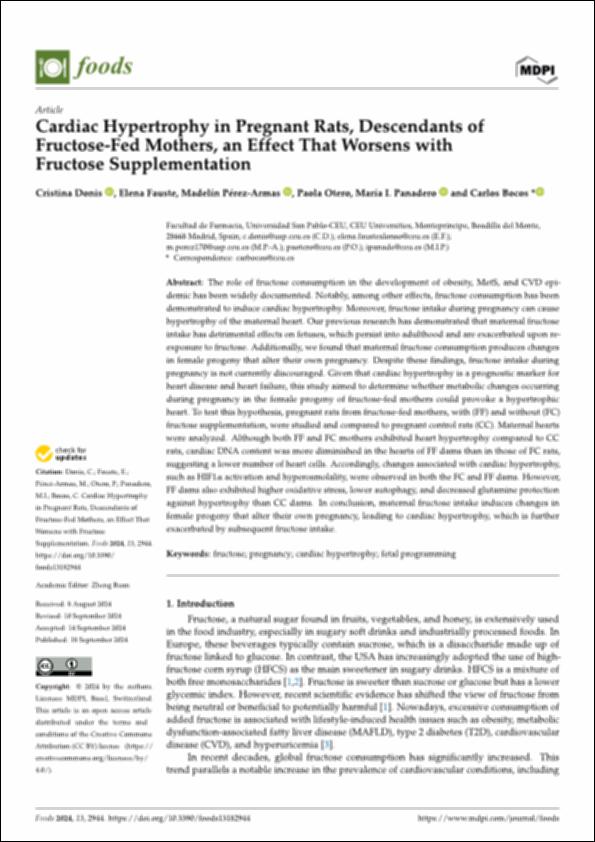Por favor, use este identificador para citar o enlazar este ítem:
http://hdl.handle.net/10637/16353Cardiac Hypertrophy in Pregnant Rats, Descendants of Fructose-Fed Mothers, an Effect That Worsens with Fructose Supplementation

Ver/Abrir:
Cardiac_Donis_et_al_Foods_2024.pdf
1,35 MB
Adobe PDF
Ver/Abrir:
Dataset Foods 2024 C.Donis.xlsx
17,03 kB
Microsoft Excel XML
Ver/Abrir:
Readme Dataset-Foods-2024-c.donis_EN.txt
670 B
Text
Ver/Abrir:
Readme Datos de Investigación-Foods-2024-c.donis_ES.txt
723 B
Text
| Título : | Cardiac Hypertrophy in Pregnant Rats, Descendants of Fructose-Fed Mothers, an Effect That Worsens with Fructose Supplementation |
| Autor : | Donis Rodríguez, Cristina Fauste Alonso, Elena Pérez Armas, Madelín Otero Gómez, Paola Panadero Antón, María Isabel Bocos de Prada, Carlos |
| Materias: | Fructose; Cardiac hypertrophy; Fetal programming; Pregnancy |
| Editorial : | MDPI |
| Citación : | Donis, C.; Fauste, E.; Pérez-Armas, M.; Otero, P.; Panadero, M.I.; Bocos, C. Cardiac Hypertrophy in Pregnant Rats, Descendants of Fructose-Fed Mothers, an Effect That Worsens with Fructose Supplementation. Foods 2024, 13, 2944. https://doi.org/10.3390/foods1318294 Donis, C.; Fauste, E.; Pérez-Armas, M.; Otero, P.; Panadero, M.I.; Bocos, C. Cardiac Hypertrophy in Pregnant Rats, Descendants of Fructose-Fed Mothers, an Effect That Worsens with Fructose Supplementation. [Dataset]. Depósito digital en CEU ReI, http://hdl.handle.net/10637/16353 |
| Resumen : | The role of fructose consumption in the development of obesity, MetS, and CVD epidemic has been widely documented. Notably, among other effects, fructose consumption has been demonstrated to induce cardiac hypertrophy. Moreover, fructose intake during pregnancy can cause hypertrophy of the maternal heart. Our previous research has demonstrated that maternal fructose intake has detrimental effects on fetuses, which persist into adulthood and are exacerbated upon re-exposure to fructose. Additionally, we found that maternal fructose consumption produces changes in female progeny that alter their own pregnancy. Despite these findings, fructose intake during pregnancy is not currently discouraged. Given that cardiac hypertrophy is a prognostic marker for heart disease and heart failure, this study aimed to determine whether metabolic changes occurring during pregnancy in the female progeny of fructose-fed mothers could provoke a hypertrophic heart. To test this hypothesis, pregnant rats from fructose-fed mothers, with (FF) and without (FC) fructose supplementation, were studied and compared to pregnant control rats (CC). Maternal hearts were analyzed. Although both FF and FC mothers exhibited heart hypertrophy compared to CC rats, cardiac DNA content was more diminished in the hearts of FF dams than in those of FC rats, suggesting a lower number of heart cells. Accordingly, changes associated with cardiac hypertrophy, such as HIF1α activation and hyperosmolality, were observed in both the FC and FF dams. However, FF dams also exhibited higher oxidative stress, lower autophagy, and decreased glutamine protection against hypertrophy than CC dams. In conclusion, maternal fructose intake induces changes in female progeny that alter their own pregnancy, leading to cardiac hypertrophy, which is further exacerbated by subsequent fructose intake. |
| Descripción : | Se adjuntan datos de investigación y fichero Readme.txt |
| URI : | http://hdl.handle.net/10637/16353 |
| Derechos: | http://creativecommons.org/licenses/by-nc-nd/4.0/deed.es Open Access |
| ISSN : | 2304-8158 |
| Fecha de publicación : | 18-sep-2024 |
| Centro : | Universidad San Pablo-CEU |
| Aparece en las colecciones: | Facultad de Farmacia |
Los ítems de DSpace están protegidos por copyright, con todos los derechos reservados, a menos que se indique lo contrario.

